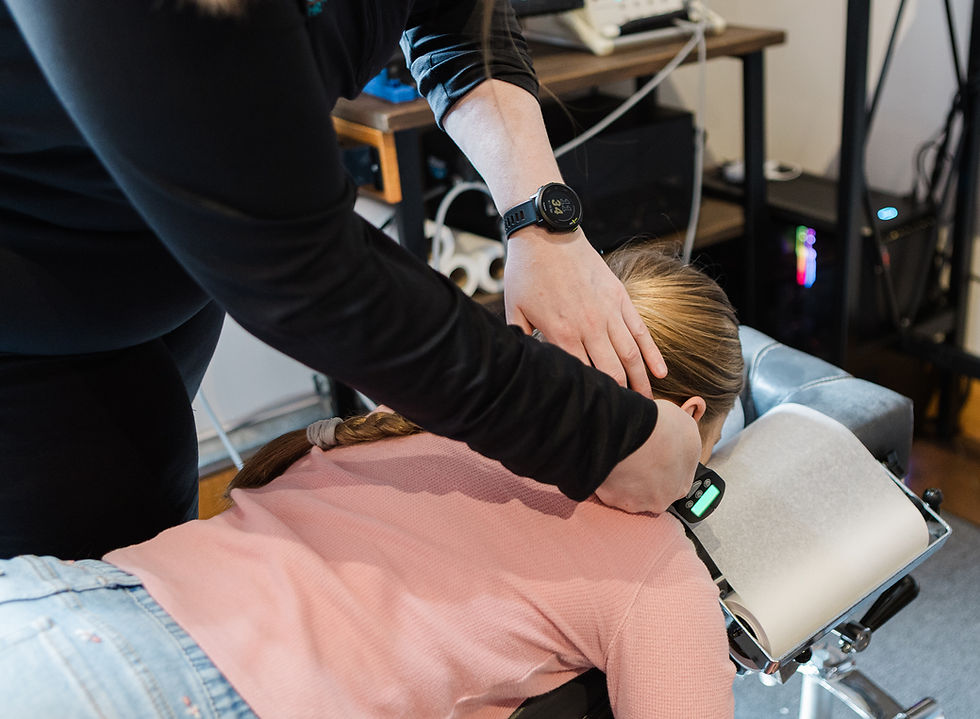How Screen Time Affects Children's Health: What Every Parent Needs to Know
- Dr. Lynn

- Sep 9, 2025
- 3 min read

In today's tech-driven world, screens are everywhere—phones, tablets, laptops, TVs, and even school devices. While technology is a powerful tool that can enhance learning and connection, it's also something that requires boundaries—especially for developing minds and bodies.
As chiropractors, we see firsthand how screen time affects children—not just in their posture, but in their sleep, focus, and emotional regulation. From posture to mood to neurological development, the effects are far-reaching.

How Screen Time Affects Children's Posture & Spinal Health
Spending hours hunched over a screen leads to what we call "tech neck"—a forward head posture that places stress on the spine and nervous system. Under Wolf’s Law, the body adapts to mechanical stress, meaning poor posture can literally reshape growing spines.
These changes disrupt normal biomechanics and can lead to spinal misalignments (subluxations) that interfere with nerve communication. Symptoms may include:
Headaches
Neck and back pain
Difficulty concentrating
Digestive issues
Mood swings
Learn more about how subluxations affect the nervous system.
Screen Time and Eye Strain in Kids
The blue light emitted by screens contributes to:
Digital eye strain
Dryness and irritation
Blurred vision
For more on screen-related stress, check out our post on nervous system stress and lifestyle habits.
Blue Light, Sleep & Melatonin
Blue light exposure can suppress melatonin production by up to 23%. This means:
Difficulty falling asleep
Poor-quality rest
Disrupted healing and learning cycles
Instead of reaching for melatonin gummies, try reducing screen time before bed—especially 1–2 hours prior.
Screen Time, Focus & Cognitive Development
Fast-paced games and social media scrolling can:
Shorten attention spans
Make it harder to focus on school or creative play
Contribute to mental fatigue
Excessive screen use also impacts the prefrontal cortex—the area responsible for decision-making, social behavior, and impulse control.
Mental Health, Mood & Screen Time
Studies have shown that children who spend more time on screens are at higher risk of:
Anxiety
Irritability
Depression
Low self-esteem
Apps designed for engagement often encourage comparison, social pressure, and overstimulation.
Social Skills and the Screen Swap
When screens replace in-person play and interaction, kids may struggle with:
Empathy
Emotional regulation
Communication

How Chiropractic Care Helps
At OWL Chiropractic, we help restore balance to the nervous system. Spinal misalignments caused by "tech neck" can influence everything from sleep to digestion to focus. Our gentle adjustments, combined with infrared thermal imaging, allow us to track nervous system changes before and after care.
You can read more about how thermal imaging works.
Real-Life Contrast: Less Screen, More Simplicity
We see many Amish families at our clinic whose children rarely interact with screens. Interestingly, many common pediatric issues related to sleep, focus, and mood are almost nonexistent in these patients. That’s not a coincidence—it’s the result of fewer neurological stressors.
Setting Limits: What Can You Do?
You can follow the AAP guidelines on screen time or use common sense:
No screens during meals
No devices 1 hour before bed
Use parental controls and app timers
Model healthy screen habits
Screen-Free Alternatives:
Outdoor play and unstructured movement
Reading physical books
Board games and puzzles
Art, crafts, and sensory play
Storytelling or audiobooks
Final Thoughts on How Screen Time Affects Children
Screens aren’t going away—but mindful use is key. Set boundaries. Encourage outdoor play. Support your child’s nervous system with chiropractic care.
Your child’s posture, brain, and emotional balance will thank you.
Learn more about our approach to whole-body pediatric care and how it supports long-term wellness.




Comments